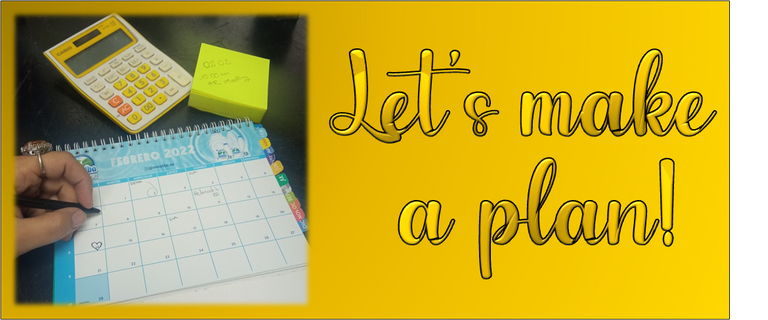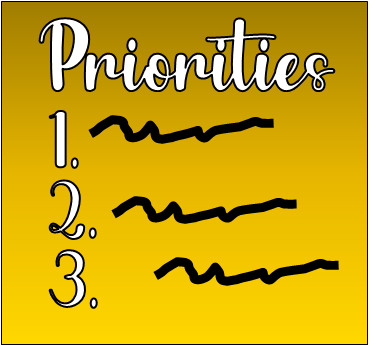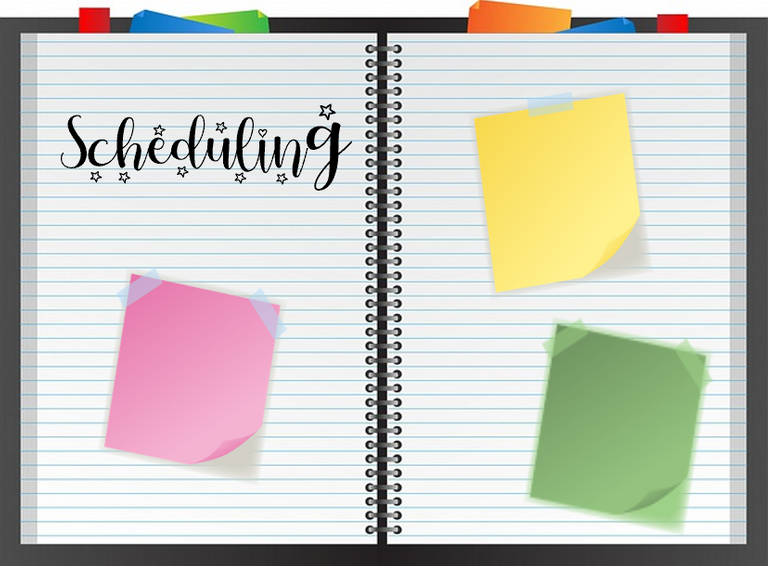
Planning, scheduling, preparing ahead, it all comes to the same. The organization is key to have everything done in time and also give us the peace of mind that we have things under control, even if it's just an illusion sometimes, especially with us parents, cause, sometimes it doesn't matter how much we try, anything can happen in the last minute that kicks our plans to curve. I'll give you this morning, for example, the restaurant I work has two types of managers, the administrative manager (that's me) and two operational managers, so, I was asked as a favor to be earlier than my usual at the office cause one of the OM had to leave early from her shift and the other one, well, it's not a very nice person... Ok, so I said ok, I'd be earlier to cover up for a few hours. So, to be able to do so, I started my daily routine earlier in the afternoon, I prepared lunch for hubby, mom, and baby girl, ironed Mya's uniform and the rest of her school stuff, prepared what I could for breakfast, got my clothes ready and made light dinner to be able to put everyone to bed early, and so we did, everything was set up perfectly to be early at the office without issues... Buuut, as my kid dreamed she was at the toilet and had an accident, so, there was a small bump on my perfectly planned morning, we got to manage it fast enough and objectives were achieved, everyone got to their job/school on time and the rest of the day went smoothly...
I guess what I'm trying to emphasize is that no matter how much (or little) we try to plan every aspect, there's always a possibility of something -and sometimes everything- can go wrong, which brings me to this question: Is it worth it to spend time planning or we should just go with it and let it "flow"

The thing about time management is that not everybody has the same skills for it, that's why sometimes we (those who have poor time management skills) see people who seem to have extra hours in their day to get everything done smoothly and stress-free. Time managing means organizing your time in a way that allows us to use it more effectively.
Four key processes can help us manage our time:


PRIORITIZATION: The Inevitable "What should i do first?". Some would prefer to do first the chores that'd take less time, and, if multitasking is possible, even better, and let the longest last. I like to start with the things I know will take the longest, cause that way, once I'm done, I can concentrate on the rest. when I became a mom I learned that multitasking was no longer an option but a necessity, so, it's a rule now of the chore chart to do more than one thing at a time, when it's doable. In this particular matter, and to get priorities straight a bit more easily we need to understand the difference between what's URGENT and what's IMPORTANT, and that is a tricky thing to learn.
Dr. J. Roscoe Miller, president of Northwestern University, said: "I have two kinds of problems: the urgent and the important. The urgent are not important, and the important are never urgent." This "Eisenhower Principle" is said to be how he organized his workload and priorities.
Important activities have an outcome that leads to us achieving our goals, whether these are professional or personal. Urgent activities demand immediate attention and are usually associated with achieving someone else's goals or meeting others' necessities.
At an organizational level there's a tool, called "Action Priority Matrix" that helps categorize the tasks to obtain the major gain, this tool can be applied to everyday life as well, but, it'll take some more time and that's what we are trying to optimize, so, simple pen and paper to mark the most important and urgent things will do to organize a bit and help us not forget tasks.


SCHEDULING: Plan how you're going to use your time, sounds pretty simple and doing it right downs a lot our stress levels. It can be a titanic task, but I have a few tips for success
1. Analyze your activities.
2. Identify available time.
3. Prioritize.
4. Add contingency time.
5. "High priority" activities for time where you are most efficient.
6. Keep it real, don't over do it.


GOAL SETTING: I'm talking from my own experience, especially with this one, if we set unrealistic goals, and can't achieve them all, we'll get frustrated and end up doing nothing of what we needed to do. So, even though it's possible that we need to do a lot of things, we NEED to separate the urgent ones and get them done first, whichever way we decide to (prioritizing by the time they need, amount of actions to complete, etc) and then, with the time left, decide to finish or leave them for later, if possible!


PROCRASTINATION IS OUR WORST ENEMY!!!! No matter how much we plan, the way to get our goals is to focus on what needs to be done and do so, there are many distractions and sometimes the workload is overwhelming and we are just tired and keep pushing those "five more minutes" But truth is, if we concentrate and try to work efficiently, we still might have a bit of time to spare, resting, doing something we don't HAVE to do but we enjoy. If we keep goals realistic and organize our schedule properly we -shouldn't- have many problems

I'm terrible at time management, I sometimes spend too much time on something only cause I need it to be extra perfect and then I find myself stressed out over not completing the to-do list I have. Once I made a list, about 31 things I wanted to do that day, it was a Saturday I think, and when hubby got back from work and asked me how my day had been I just started crying cause of those 31 I had done about 18...Being a mother of two, doing all the cooking, cleaning, trying to blog more often(which I'm failing at and hating it) while working 6 hours a day at the office sometimes gets a bit too hard to find time to do everything, but when I focus and set my goals it's a lot easier, also helps a lot to have a bit of help every once in a while. Creating a routine can also be of help, even though it's a bit boring and monotonous, it gives a feeling of tranquility when we have a well-mapped plan and does it regularly.
It's also very important, aside from the scheduling contingency time (in case something unexpected comes up), to schedule a little of "ME" time. It can be a hot shower, one episode of that tv show or movie, a chapter of a good book, or just sipping a cup of coffee and chatting with someone, truth, these spaces of me tan can often become the source of our procrastination but, that's why is important to include it in our plan so we don't feel it's all work and no play!

